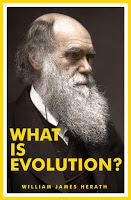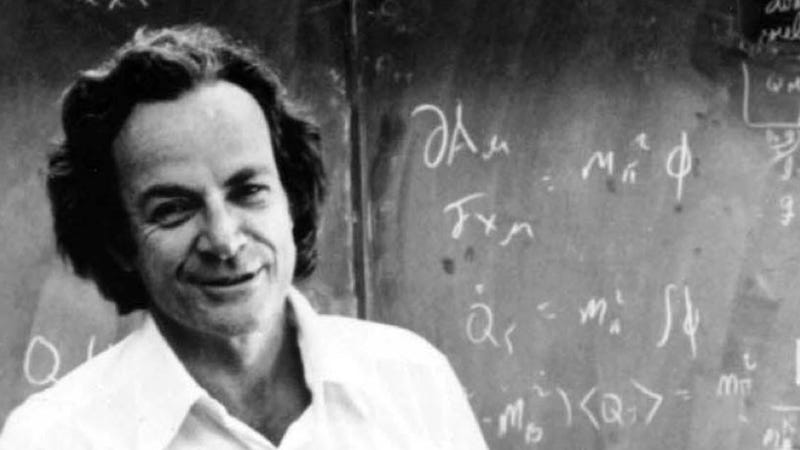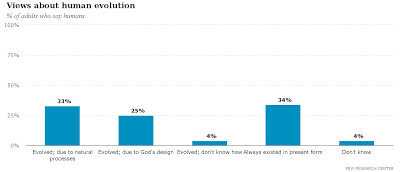Deep down inside, we all have a desire to know how we got here. Some claim it was God (creationists), some claim there was a first single cell and it increased in complexity (evolutionists), and some (theistic evolutionists) claim it was a blend of God and evolution.
Theistic evolution is a philosophical/religious idea that acknowledges the existence of a supernatural creator (God) and purely naturalistic (Darwinian) explanations for the emergence of biodiversity to also be true. There are differing strains of theistic evolution, but regardless of the varying details it has emerged within most religions that have an account of origins recorded in ancient texts and oral traditions. Judeo-Christian faith seems to be at the forefront of this conversation, but in short, theistic evolution is the accommodation of Darwinian thought into any religious text pertaining to the origin of life’s biodiversity.
According to the Pew Forum, 25% of Americans believe that humans evolved due to God’s design and for the sake of clarity, this letter will focus on the accommodationists of Darwinian evolution within the fold of Christianity.
In modern times, theistic evolution has many champions like John Walton, Francis Collins, and N.T. Wright, however St. Augustine of the fifth century is referenced more than any other. When writing of ignorant Christians speaking with intelligent non-Christians, St. Augustine wrote:
“The shame is not so much that an ignorant individual is derided, but that people outside the household of the faith think our sacred writers held such opinions, and, to the great loss of those for whose salvation we toil, the writers of our Scripture are criticized and rejected as unlearned men. If they find a Christian mistaken in a field which they themselves know well and hear him maintaining his foolish opinions about our books, how are they going to believe those books in matters concerning the resurrection of the dead, the hope of eternal life, and the kingdom of heaven, when they think their pages are full of falsehoods on facts which they themselves have learnt from experience and the light of reason?”
In essence, the heart behind theistic evolution is pure. If a learned and educated non-Christian were to hear a Christian’s opinion on the origin of life’s biodiversity that conflicts with empirical data, then the non-Christian would be less likely to value the resurrection of Jesus Christ and therefore remain a “lost” soul. Most theistic evolutionists have accommodated Darwinian evolution into scripture because they agree with Darwinian ideas and so they will not be “criticized and rejected as unlearned men” in order to win “those for whose salvation we toil.” For if a non-Christian is “in a field which they themselves know well” and hears a Christian “maintaining his foolish opinions about our books,” the Christian accommodationist believes they have a limited ability to share the Gospel. Most theistic evolutionists are God fearing and Jesus loving people that have let the conversation and the logic rest at this point. In doing so, they have grown comfortable with their accommodation of Darwinian evolution into the holy scripture. So much that some theistic evolutionists are senior pastors of churches that teach their communities to follow suit. I do not believe there is a malicious bone in the bodies of most theistic evolutionists, but I do believe they have failed to honestly and logically answer three very poignant questions.
1 – What is evolution?
Unfortunately, there is no scientifically agreed upon definition of biological evolution. Conversations on the subject are riddled with confusion and misuse of terms. Yet, science is the only reason to subscribe to the idea that life’s biodiversity emerged due to natural forces, even though there is no scientific consensus and agreed upon definition of biological evolution. Many claim there is a conflict between faith and science, but in reality there is good reason to accommodate science into one’s system of beliefs. In fact, a faith that ignores science will ultimately be a faith comprised solely of fools. Yet, a faith that adulterates its core belief to accommodate pseudoscience will also become a den of fools. Theistic evolutionists must be confident in what evolution is and in empirical data that supports it. The conversation starts and stops with science, so if you are a subscriber of evolutionary thought, start reading peer reviewed scientific journals like the Proceedings of the National Academy of Sciences which describes science as being twofold.
“The first component consists of the formulation of a conjecture or hypothesis about the natural world. The second component consists of testing the hypothesis by ascertaining whether deductions derived from the hypothesis are indeed the case in the real world.”
The “result” of evolution is species, aka life’s biodiversity. Darwin became famous for authoring the book Origin of Species and explained how Natural Selection worked. He wanted to explain how all of the differing species originated and therefore started with species being the result and worked his way backward to the origin. Shockingly, Darwin did not include a definition of evolution in his book, but the title says a lot: The Origin of Species, by Means of Natural Selection. So, if life’s diverse species did indeed originate due to natural selection, then confirmation/falsification could be found through the process of science.
Is the emergence of new and diverse species a naturally occurring phenomena that we can observe, test, replicate, and verify? Does natural selection lead to the emergence of new and unique species? What empirical data has the scientific community produced that confirms the origin of species is, in fact, by means of natural selection?
The “means” of evolution has to do with change taking place over time due to the natural selection of genetic mutations. So the basic idea of evolution is that all of life’s biologically diverse species came to be via the accumulation of “survival-increasing” adaptations brought on by environmental pressures that select certain organisms to pass along acquired genetic mutations. In essence, life under selective natural pressures produces extraordinary adaptations. These adaptations add up over long spans of time to produce beautifully diverse species. The following equations are a simple way of understanding this concept.
EVOLUTION
Life Adapting + Time = Diverse Species
or
Common Ancestor + Change in Allele Frequency = Biodiversity
Taking cues from the National Academy of Sciences, what empirical tests of evolution have produced data that confirms the emergence of diverse species to be the result of life adapting over time? Is this something that can be tested and confirmed by observations made in the real world?
Science is the only reason to subscribe to evolution and if evolution eludes what the National Academy of Sciences identifies as being scientific, then what is it? To help you in this process, I have written two books. In
What Is Evolution? I do not mention scripture nor the Creation account of Genesis, for this book is focused on empirical data and poses many questions toward evolutionary ideas. I hope you join me.
2 – Does the Supernatural influence evolution?
As previously stated, theistic evolutionists have accommodated Darwinian evolution into scripture in order to reconcile their agreement with Darwinian ideas. Also, they hope to not be “criticized and rejected as unlearned men” in order to win “those for whose salvation we toil.” For if a non-Christian is “in a field which they themselves know well” and hear a Christian “maintaining his foolish opinions about our books,” the Christian accommodationist believes they have a limited ability to share the Gospel.
I believe the idea of theistic evolution was developed so that the evolutionary community would not immediately discount Christianity and therefore the Gospel could be shared. If a Christian accepts that God used Darwinian evolution to create, then evolutionary biologists will not think of them as having a foolish opinion of a field that non-Christians know well. Unfortunately, this is a ONE WAY street. The Christian accommodation of evolution makes the theistic evolutionist believe he does not look like a fool, but the non-Christian evolutionary biologists still identifies said person as being foolish.

Charles Robert Darwin, the author of the Origin of Species, is an icon of historical importance. His main contribution to the world was his idea of an unintentional, breeder-less version of artificial selection which he called natural selection. Darwin communicated to the evolutionary community that he believed species, aka biodiversity, to be mutable and therefore emerged into existence via adaptations brought on by natural forces. In the last pages of his great work, he described how the process of evolution takes place due to natural laws.
“It is interesting to contemplate an entangled bank, clothed with many plants of many kinds, with birds singing on the bushes, with various insects flitting about, and with worms crawling through the damp earth, and to reflect that these elaborately constructed forms, so different from each other, and dependent on each other in so complex a manner, have all been produced by laws acting around us.”
Theodosius Dobzhansky is one of the most prominent evolutionary biologists and geneticists to have ever lived. His words have been quoted countless times and his words most quoted are, “Nothing in biology makes sense except in the light of evolution.” Dobzhansky is a notable author and has been published and cited in seemingly endless scientific journals. If anyone is in “a field which they themselves know well” (Augustine), Theodosius Dobzhansky is such a person. When it comes to evolution via natural selection, he wrote about the likelihood of supernatural involvement. “What a senseless operation it would have been, on God’s part, to fabricate a multitude of species ex nihilo (Latin for: out of nothing) and then let most of them die out! There is, of course, nothing conscious or intentional in the action of natural selection.”
Edward O. Wilson has authored over twenty books, received two Pulitzer Prizes, was given the National Medal of Science, and held a professorship in the Department of Organismic and Evolutionary Biology at Harvard University from 1956 to 1996. Again, if anyone is in “a field which they themselves know well” (Augustine), Professor Wilson is such a person. In his book, From So Simple a Beginning, Wilson writes: “Evolution in a pure Darwinian world has no goal or purpose: the exclusive driving force is random mutations sorted out by natural selection from one generation to the next.”

Francisco J. Ayala is an accomplished professor and evolutionary biologist at the University of California, Irvine. Under the eye of the famed evolutionary biologist Theodosius Dobzhansky, Ayala received his doctorate in 1964. He also has served the Board of the American Association for the Advancement of Science as President and Chairman. Being the author of over nine hundred publications and thirty books, Francisco J. Ayala is most definitely a person in “a field which they themselves know well” (Augustine). In the highly respected Proceedings of the National Academies of Sciences, Ayala describes evolution.
“It was Darwin’s greatest accomplishment to show that the complex organization and functionality of living beings can be explained as the result of a natural process–natural selection–without any need to resort to a Creator or other external agent. … The scientific account of these events does not necessitate recourse to a preordained plan, whether imprinted from the beginning or through successive interventions by an omniscient and almighty Designer. Biological evolution differs from a painting or an artifact in that it is not the outcome of preconceived design. The design of organisms is not intelligent but imperfect and, at times, outright dysfunctional.”
Also being in “a field which they themselves know well” (Augustine), Professor of Ecology and Evolution at the University of Chicago, Jerry A. Coyne is such a person. Coyne is also the author of Why Evolution is True and has communicated that:
“If you accept even a little bit of divine tinkering in the evolutionary process, you’re not standing on some inclusive middle ground—you are, as P.Z. Myers said, halfway to crazy town. There can be no compromise with superstition, for superstition is the camel’s nose in the tent of science.”
Richard Dawkins is an evolutionary biologist that held a position at the University of Oxford as Professor for Public Understanding of Science, he is the founder of the Richard Dawkins Foundation for Reason & Science, and a renowned author of many books. Again, if anyone is in “a field which they themselves know well” (Augustine), Richard Dawkins is such a person. Dawkins has stated that, “a true understanding of Darwinism is deeply corrosive to religious faith,” and that there is “no scientific reason to believe any sort of supernatural creator. That came with the understanding of Darwinian evolution.”
Many other experts in the field of evolutionary biology are also very clear about the fact that Darwinian evolution by means of natural selection is just that, natural… and not supernatural in anyway. So, what does this mean when it comes to theistic evolution?
Theistic evolutionists claim evolutionary processes to occur naturally, yet a supernatural being guides said processes either naturally or supernaturally depending on the situation. Due to this paradox, the evolutionary community views the idea of theistic evolution as illogical, void of empirical support, and by no means a true representation of Darwinian evolution. Renowned experts in the field of evolutionary biology view theistic evolution as completely false. Evolutionary biologists are in agreement that supernatural mechanisms are not involved in any Darwinian evolutionary processes.
Christians that have adopted theistic evolution are still seen as fools by non-Christian evolutionists, and therefore have not increased their ability to share the Gospel. The accommodation of Darwinian evolution to scripture is a ONE WAY street that nullifies any attempts of avoiding the negative scenario of which St. Augustine described.
3 – Where is evolution in scripture?
Theistic evolutionists place confidence in the idea they are “honest” interpreters of the Word of God, but is this true? If evolution does not conflict with scripture and is an honest interpretation, then would not the ancient Hebrews and the Apostles have accommodated for evolution long ago? Yet, we do not see the accommodation of Darwinian ideas into scripture until recent times because the scriptures do not reference an inkling of such a notion.
If one were to find empirical data that supported evolution and somehow could avoid “foolish status” among non-Christian evolutionists, where in scripture would the compromise end and who would get to say so?
I am hopeful we Christians can all agree that scriptures detailing the baptism of Jesus are true. “This is my Son, whom I love; with him I am well pleased.” – Matthew 3:17
Yet, if the words of God recorded in the account of the baptism of Jesus are true and agreed upon, then other points in scripture when God speaks, must also be agreed upon. “It is not good for the man to be alone. I will make a helper suitable for him.” – Genesis 2:18
Theistic evolution claims that man was never alone, for evolution takes place in a group of organisms over great spans of time. If man were to have ever been alone, the evolutionary production of a suitable helper would have taken eons, which is much too long in regard to the lifetime of said lonely man. According to the logic of theistic evolutionists, did God actually speak the words “It is not good for the man to be alone?” What about the baptism of Jesus, did God say “This is my Son, whom I love; with him I am well pleased?” Where does the accommodation and compromise end? Should we delete some of the verses when God spoke? What about the Psalmist’s words? “For you created my inmost being; you knit me together in my mother’s womb.” – Psalms 139:13 What knits a human together in their mother’s womb, God or naturally existing self-arranging molecules? According to evolution, there is zero supernatural involvement.
If theistic evolution accommodates evolution into scripture on account of science and therefore must logically disregard such verses like, “It is not good for the man to be alone,” then where does the compromise end? Is the need for a savior nonessential enough to delete? When Paul was speaking of sin and death, he wrote: “For since death came through a man, the resurrection of the dead comes also through a man. For as in Adam all die, so in Christ all will be made alive.” – 1 Corinthians 15:21-22
Paul also wrote: “Therefore, just as sin entered the world through one man, and death through sin, and in this way death came to all people...” – Romans 5:12
Are these words of Paul able to be dismissed? How does a theistic evolutionist reconcile our need for a savior? Interestingly enough, Peter Enns the author of
The Evolution of Adam and prominent theistic evolutionist is honest about not knowing how to reconcile our need for a savior.
“By saying that Paul’s Adam is not the historical first man, we are leaving behind Paul’s understanding of the cause of the universal plight of sin and death. But this is the burden of anyone who wishes to bring evolution and Christianity together…” (Enns 2012, p. 123)What other verses in scripture are able to be disregarded? Science and empirical data obtained through observation has verified Archimedes’ principle of buoyancy to be true. Real science shows that men cannot walk on water and logically, a theistic evolutionist must side with the empirical data. According to the logic of theistic evolution disregarding the miracle of creation due to what modern science says about it, the account of Jesus and Peter walking on water must also be disregarded due to what modern science says about this miracle.
If the miracle of creation is disregarded and supplanted by “science,” where in scripture would the compromise end? The miracle of the virgin birth? The miracle of Jesus turning water into wine? The miracle of Jesus feeding the five thousand? The miracle of Jesus and Peter walking on water? The miracle of the resurrection of Jesus Christ?
Scripture is paramount to most Christian movements and the Vineyard Movement is no different when outlining their Core Values.
“Every community of faith has two major obligations in regards to its faith, namely absolute faithfulness to the Word of God, and sensitivity [not conformity] to the world in which that community lives. This means that the Vineyard movement must express the historical, biblical [not extra-biblical], orthodox Christian beliefs that we hold in common with all Christians, [theistic evolutionists have let go] and the particular doctrines that are our distinctive voice [which is the supernatural power of God – yesterday, today, and forever], in terms that are relevant to 21st century Christians.” (emphasis added)
What did Jesus say about evolution?
When speaking of marriage He quoted Genesis 1:27 said:
“…at the beginning the Creator ‘made them male and female’…” – Matthew 19:4
If Jesus Christ himself spoke very clearly that, from the start, humans were made male and female… how could an honest person take these words to mean that over eons, an asexual and unicellular organism evolved into a group of humans? In the time of Jesus there were also folks who doubted the authenticity of Genesis and Jesus confronted them by saying, “If you believed Moses, you would believe me, for he wrote about me. But since you do not believe what he wrote, how are you going to believe what I say?” – John 5:46
Jesus Christ also mentions Abel as a real person equally as real as Zachariah. In Matthew 23, Jesus said to the teachers of the law and Pharisees, “…upon you will come all the righteous blood that has been shed on earth, from the blood of righteous Abel (son of Adam) to the blood of Zechariah son of Berekiah, whom you murdered between the temple and the altar.” – Matthew 23:35
Jesus Christ himself references Adam and Eve as actually being the first humans to have been miraculously created by God. Jesus never alluded to Genesis as being mythical, metaphorical, or some form of Hebrew poetry because according to the book of John, Jesus was an eye witness to all of Creation including the miracle of of Adam & Eve coming into existence.
“In the beginning was the Word, and the Word was with God, and the Word was God.” – John 1:1
Nowhere in scripture does Jesus, nor any other author, give an inclining of the possibility of Adam and Eve never actually existing. Also, nowhere in scripture can we find an inclining of evolution.
Are followers of Christ Jesus willing to distort the words of Christ Jesus in order to fit Darwinian ideas into scripture? What is worth drawing a line in the sand over, reserving the right to lean on our own understanding, or trusting the Lord with all our hearts?
Proverbs 3:5-6 “Trust in the Lord with all your heart and lean not on your own understanding; in all your ways submit to him, and he will direct your paths.”
1 Peter 3:15 – “But in your hearts revere Christ as Lord.”
Revering Christ as Lord is trusting that the words of Jesus Christ are true. The idea of accommodating biological evolution into scripture is far from trusting and revering Jesus as Lord.
CONCLUSION
For some, the false science of evolution can be easily accommodated into scripture. Yet after a simple examination of scripture, it is obvious that theistic evolutionists are in oblate contrast to the word of Christ Jesus himself.
Theistic evolution is an idea that, I hope, some Christians are subscribing to because of their love for the lost. I hope they are trying to help remove barriers for people to come to Christ. This is a noble reason and I believe it pleases God. Yet, now that this reason has been shown to be against the words of Christ, Christians who accommodate Darwinian ideas need to take a hard look at their compromise.
Think about these three questions. Ask the Holy Spirit to guide you to Truth. If you are a theistic evolutionist that believes your reasoning is pure and you can be honest in answering these questions, then praise God! But, there is a stark reality for those who twist scripture and 2 Corinthians 11:14-15 does of good job of making this truth known. “Satan himself masquerades as an angel of light. It is not surprising, then, if his servants also masquerade as servants of righteousness. Their end will be what their actions deserve.”

Are the people of the Word opposed to science? Absolutely not, we fly to far flung countries, drill wells, install solar panels, give medicine, and so on. Science is good and it is a gift, but do people of the Word give value to scripture because of science? Absolutely not, for it is by faith that we understand. We give value to scripture because we believe. Science shows that walking on water is not possible, yet by faith Christians hold fast to the miracle of Jesus and Peter doing so.
There is no empirical way of validating the possibility of a supernatural force bringing all things into existence out of nothing. The scriptures validate this:
“He has made everything beautiful in its time. He has also set eternity in the human heart; yet no one can fathom (scientifically know) what God has done from beginning to end.“
– Ecclesiastes 3:11
“By faith (not empirical data) we understand (not know) that the universe was formed at God’s command, so that what is seen was not made out of what was visible.“
– Hebrews 11:3
There is no empirical way of validating the possibility of a
natural force bringing all things into existence out of nothing. Science has revealed the Law of Conservation of Energy which shows that energy/matter cannot be created nor destroyed. The origin of all energy/matter is beyond observation, test-ability, repeat-ability, and verification which means any explanation requires faith. Yet by faith Christians hold fast to the Miracle of Creation. We do not lean on our own understanding, we trust and believe in the miracle of the virgin birth, the miracle of the resurrection, and many others. We have not been instructed, nor given the authority to alter scripture in order to accommodate a belief in what we think is most plausible. If every word in scripture is God breathed (
2 Timothy 3:16), then every word that we wish had been included, is actually God omitted (
Proverbs 30:5-6). The words of James Scott reiterate this truth, “
God used the writing efforts of inspired men to speak his word to us. He did not merely approve or endorse what they wrote, or have enough influence on what they wrote that he could claim it as his own; rather, he caused them, through the inspiration of the Holy Spirit, to write what they wrote. God did not concur with what the human writers wanted to write; they concurred with what he wanted to write.”
(Scott, J. W. 2009a. The inspiration and interpretation of God’s word, with special reference to Peter Enns, part I: Inspiration and its implications. Westminster Theological Journal 71, no. 1:141)
What scriptures actually support the idea of theistic evolution? When it comes to actual scientists in the field of evolutionary biology, who supports theistic evolution? Darwinian accommodation into faith only comes from the ideas of those looking to suit their own desire of pushing the evolutionary agenda. In doing so theistic evolutionists find themselves with a new and unique faith.
“In the presence of God and of Christ Jesus, who will judge the living and the dead, and in view of his appearing and his kingdom, I give you this charge: Preach the word; be prepared in season and out of season; correct, rebuke and encourage—with great patience and careful instruction. For the time will come when people will not put up with sound doctrine. Instead, to suit their own desires, they will gather around them a great number of teachers to say what their itching ears want to hear. They will turn their ears away from the truth and turn aside to myths. But you, keep your head in all situations, endure hardship, do the work of an evangelist, discharge all the duties of your ministry.” – 2 Timothy 4:1-5
So, you may be asking yourself, now what? In this conversation of asking how we got here, there are three main camps. Unfortunately, each camp has assumptions about folks who are in a different camp and the assumptions quickly leave the realm of science to engage philosophy and theology. Case in point, anti-evolutionists are considered pro-creationists and therefore pro-theism, while anti-creationists are considered pro-evolution and anti-theistic, but then there are theistic evolutionists that are quickly considered non-scientific by the evolutionists and pro-evolutionists by the pro-creationists. We all have a smug arrogance at times and it is ridiculous.

In addition to subscribing to evolution, creationism, or theistic evolution, perhaps there is a fourth stance. For if anyone from the main three camps could step up to the microphone with empirical data and put this debate to rest, they would have. We must choose to be aligned with true knowledge. In Greek, “gnosis” is the word for knowledge. To say we have “gnosis,” means we know. Inversely, our inability to know is called “agnosis.” When it comes to origins, what approach is more logical and honest than to claim scientific agnosis? Our inability to know how all of the diverse species originated is not something to be ashamed of nor afraid to admit. In fact, understanding that we do not know furthers scientific investigation and protects us from becoming erroneously dogmatic. It is clear that evolutionists are not setting up empirical data producing scientific tests, and scripture calls believers to have faith. So, the next time you are asked to label yourself and/or choose a camp when it comes to the explanation of the origin of diverse species, call yourself an “Empirical Agnostic,” because scientifically we cannot know. Yes, the term “Empirical Agnosticism” is a bit self-contradictory and that is why it works so well when used in regard to the origin of biodiversity. There is no scientific honesty from those who claim to have complied empirical data in regard to the emergence of diverse species, for there is no way to observe, test, replicate, nor verify this said emergence.

Nobel Prize winning physicist Richard P. Feynman stated: “
I can live with doubt, and uncertainty, and not knowing. I think it’s much more interesting to live not knowing than to have answers which might be wrong.”
https://youtu.be/I1tKEvN3DF0
Scriptures taken from the Holy Bible, New International Version®, NIV®. Copyright © 1973, 1978, 1984, 2011 by Biblica, Inc.™ Used by permission of Zondervan. All rights reserved worldwide. www.zondervan.com The “NIV” and “New International Version” are trademarks registered in the United States Patent and Trademark Office by Biblica, Inc.™













